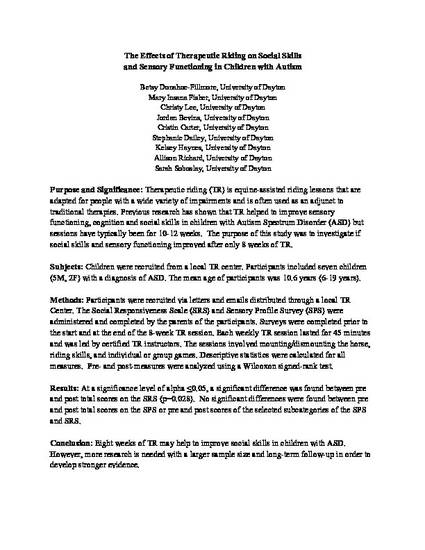
Purpose and Significance: Therapeutic riding (TR) is equine-assisted riding lessons that are adapted for people with a wide variety of impairments and is often used as an adjunct to traditional therapies. Previous research has shown that TR helped to improve sensory functioning, cognition and social skills in children with Autism Spectrum Disorder (ASD) but sessions have typically been for 10-12 weeks. The purpose of this study was to investigate if social skills and sensory functioning improved after only 8 weeks of TR.
Subjects: Children were recruited from a local TR center. Participants included seven children (5M, 2F) with a diagnosis of ASD. The mean age of participants was 10.6 years (6-19 years).
Methods: Participants were recruited via letters and emails distributed through a local TR Center. The Social Responsiveness Scale (SRS) and Sensory Profile Survey (SPS) were administered and completed by the parents of the participants. Surveys were completed prior to the start and at the end of the 8-week TR session. Each weekly TR session lasted for 45 minutes and was led by certified TR instructors. The sessions involved mounting/dismounting the horse, riding skills, and individual or group games. Descriptive statistics were calculated for all measures. Pre- and post-measures were analyzed using a Wilcoxon signed-rank test.
Results: At a significance level of alpha <0.05, a significant difference was found between pre and post total scores on the SRS (p=0.028). No significant differences were found between pre and post total scores on the SPS or pre and post scores of the selected subcategories of the SPS and SRS.
Conclusion: Eight weeks of TR may help to improve social skills in children with ASD. However, more research is needed with a larger sample size and long-term follow-up in order to develop stronger evidence.
Clinical Merit: This study indicates that TR may benefit children with ASD, by improving social skills, and may be used as an additional therapeutic intervention.
- hippotherapy,
- physical therapy,
- autism,
- social skills,
- sensory function
Available at: http://works.bepress.com/mary_fisher/35/

First Place Poster Award Winner, Ohio Physical Therapy Association OPTimize Conference, September 2019.
Full list of authors: Donahoe-Fillmore B, Fisher MI, Lee C, Behnfeldt J, Bevins J, Carter C, Dailey S, Haynes K, Richard A, Soboslay S.